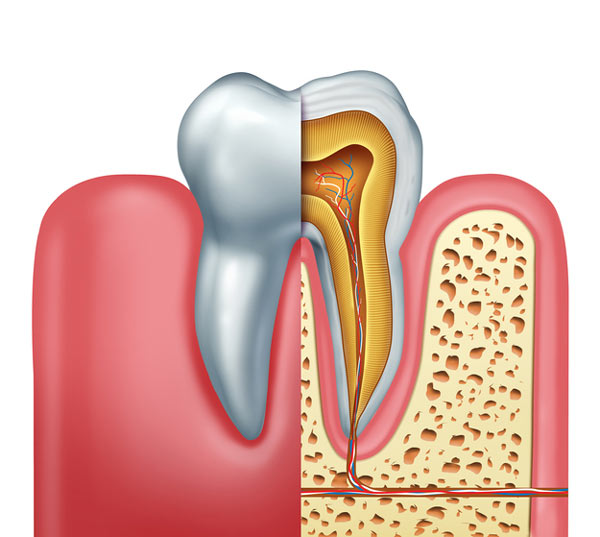Root Canal for Children
Burliington, MA
 A root canal may seem like a procedure reserved for adults, but the treatment is also used in pediatric dentistry. At Dental Care of Burlington we may recommend a root canal if your child has a tooth that is significantly damaged due to tooth decay or trauma. This routine procedure can even help save your child’s smile! A root canal may seem like a procedure reserved for adults, but the treatment is also used in pediatric dentistry. At Dental Care of Burlington we may recommend a root canal if your child has a tooth that is significantly damaged due to tooth decay or trauma. This routine procedure can even help save your child’s smile!
Does My Child Need a Root Canal?
Both primary (baby) and permanent teeth contain pulp - the nerves, blood vessels, and connective tissues - underneath the hard outer layer we call enamel. The pulp is located deep within the tooth, in an area known as the "pulp chamber," which branches out towards the roots. These tissues are essential to the life of a tooth.
If the pulp becomes damaged or diseased, it can result in several painful symptoms. During a clinical exam, Dr. Kamand Shaibani will be able to determine the extent of the damage, and whether or not a root canal is necessary. Despite common misconceptions, a root canal is designed to relieve pain, not cause it!
The three most common reasons for a root canal include:
| • |
Deep tooth decay
|
| • |
Injury or trauma to the tooth that affects the nerve
|
| • |
A fracture that leaves the pulp exposed to bacteria |
We will always recommend a root canal over the extraction of a permanent tooth. Root canals for primary teeth are relatively uncommon. However, saving a baby tooth can prevent eruption complications that result in impacted or crooked teeth.
Root Canal Procedure
There are two types of root canal therapy: pulpotomy and pulpectomy. A pulpotomy involves a partial pulp removal, while we remove the entire pulp during a pulpectomy. Despite their differences, both procedures follow the same basic steps.
Most root canals are broken down into two appointments. During the first appointment, a small hole is drilled into the enamel to expose the pulp. Next, we will remove the diseased pulp from the pulp chamber and roots.
Once the damaged pulp is removed, Dr. Kamand Shaibani will clean and shape the canals in preparation for gutta-percha. Gutta-percha is a rubber-like material that is used to fill the empty canals, sealing them off from further infection. Once the root canal is complete, we will take an impression.
After a root canal, a tooth may become brittle or structurally unsound. During a follow-up appointment, we typically need to place a crown. A crown will protect the tooth from further damage. We typical use stainless-steel crowns for primary teeth. These days, permanent teeth are often capped with porcelain crowns due to their superior aesthetics.
After Your Child’s Root Canal
During the procedure, we use a local anesthetic to numb the tooth and eliminate pain. We may also recommend sedation if your child is fearful or anxious about the procedure. Once these medications wear off, there may be some minor discomfort.
A permanent tooth treated with a root canal can last a lifetime with the proper maintenance. Be sure your child is brushing and flossing the area during their oral hygiene routine. We also ask that you schedule regular appointments so we can monitor their progress and prevent additional problems.
Schedule a Consultation
If your child currently has a severely damaged tooth, they may need a root canal. Call 781-362-2260 to schedule a consultation appointment today! |